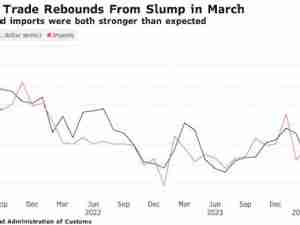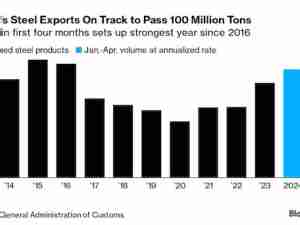Trump Just Redefined Western Values Around Faith, Not Democracy
By: Marc Champion | Jul 06 2017 at 05:31 PM | International Trade
U.S. President Donald Trump just sought to redefine the West.
In a speech to cheering crowds in Warsaw on Thursday, Trump described the West’s values in terms of religion and culture and called for the defense of its civilization against radical Islam. It amounted to a manifesto for his foreign-policy vision.
The address included repeated invocations of God, faith, tradition, national sovereignty and family. It made only passing reference to what are usually cited as core Western values: the rule of law, democracy and freedom of speech. Religious tolerance did not get a mention.
“The people of Poland, the people of America, and the people of Europe still cry out ‘We want God,’’’ said Trump. “We put faith and family, not government and bureaucracy, at the center of our lives.’’
It’s an outlook fervently shared by the president’s hosts, Poland’s Law & Justice Party. Last year, Polish President Andrzei Duda took part in a religious ceremony that officially recognized Jesus as the King of Poland. And the worldview Trump outlined in Warsaw also chimes with that of his Russian counterpart Vladimir Putin. The two leaders will meet for the first time on Friday at a summit of the Group of 20 major economies in Hamburg.
But while popular among eastern Europe’s conservatives, Trump’s reinterpretation of Western values will set him further apart from more liberal G-20 leaders such as German Chancellor Angela Merkel, already alienated by the president’s opposition to climate-change targets and free-trade agreements.
Culture of Washington
Some of Trump’s comments were less out of step with Washington’s traditional priorities. Republican Senator Lindsey Graham, a habitual critic of the president, said he was encouraged by relatively strong language attacking the Russian interventions in Ukraine and Syria, as well as by Trump’s statement of support for the North Atlantic Treaty Organization’s Article 5 clause on collective defense.
The speech contained “both conventional foreign-policy rhetoric and nativist undertones,” said Erik Brattberg, director of the Europe Program at the Carnegie Endowment for International Peace in Washington. Its basic message was “that the U.S. remains the indisputable leader of the West,” he said.
Trump stuck to his theme after leaving Poland. “THE WEST WILL NEVER BE BROKEN. Our values will PREVAIL. Our people will THRIVE and our civilization will TRIUMPH!’’ he tweeted after landing in Hamburg.
Clash of Civilizations
Much of the address in Warsaw’s Krasinski Square was devoted to a recounting of Poland’s struggles against Russia and Nazi Germany, in particular the 1944 Warsaw Uprising. But in an earlier briefing, a White House official had singled out the role of faith and the need to defend Western civilization as key messages.
“It was very Huntingtonian,’’ former Polish Foreign Minister Radek Sikorski said of the speech. “The Polish government has reason to be very pleased with it, because it very much echoes their philosophy.”
Sikorski was referring to the 1993 Foreign Affairs article by Harvard scholar Samuel P. Huntington, “The Clash of Civilizations?’’ In the article and a later book, Huntington argued that the West’s ideological contest with the former Soviet Union would be followed by a growing struggle between religious blocs.
Many leaders have seen in Huntington’s thesis a warning of what to avoid rather than an agenda to pursue—an important distinction when addressing immigration, for example, or combating Islamist terrorism. By contrast, some of Trump’s current and former aides, including chief strategist Steve Bannon and former National Security Adviser Michael Flynn, have embraced the idea that a fundamentally Christian West is at war with Islam.
‘Evil People’
Bannon laid out his view last year in a now-famous contribution via video link to a Vatican conference. He said the Judaeo-Christian West had become too secular and fallen into crisis as a result. “We’re at the very beginning stages of a global conflict” against “Islamo-fascism,” Bannon said.
Flynn made a similar point in a book he co-authored the same year, which argued that “we’re in a world war against a messianic mass movement of evil people, most of them inspired by a totalitarian ideology: Radical Islam.”
Trump identified bureaucracy alongside terrorism as the twin threats the West must defeat. That reference is likely to be seen in Poland, and elsewhere in Europe, as directed at the Brussels-based institutions of the European Union. The EU launched an investigation into Poland in 2016, citing threats to the rule of law that it said were incompatible with EU values, such as suppression of judicial independence and media freedoms.
There was no mention of those allegations in Trump’s speech. A White House official said his remarks should not be interpreted as an attack on the EU.
Still, the president’s “strong praise for the conservative government in Poland can be seen as a snub of Angela Merkel’s Germany and the EU, with whom Warsaw has an increasingly strained relationship,” Carnegie’s Brattberg said.
In Poland, there are many who’d take Merkel’s side of that argument, against Trump’s.
“For me, talking about Western civilization without mentioning rule of law, democracy and human rights isn’t possible,’’ said Jerzy Stępień, a former head of Poland’s constitutional court, which has been involved in a protracted battle with the Law & Justice government. “I’m not sure how President Trump defines Western civilization, but for me these attributes are indispensable.”









